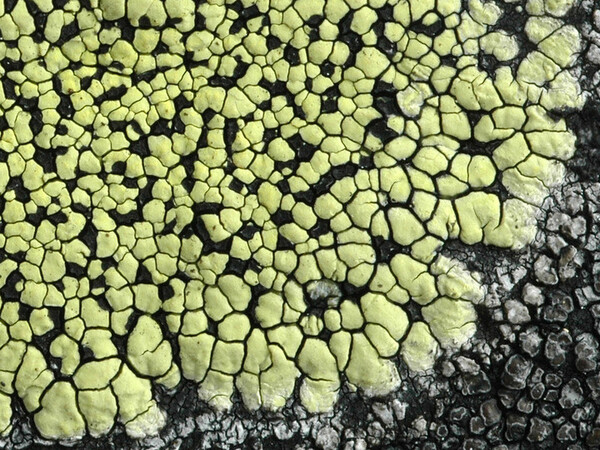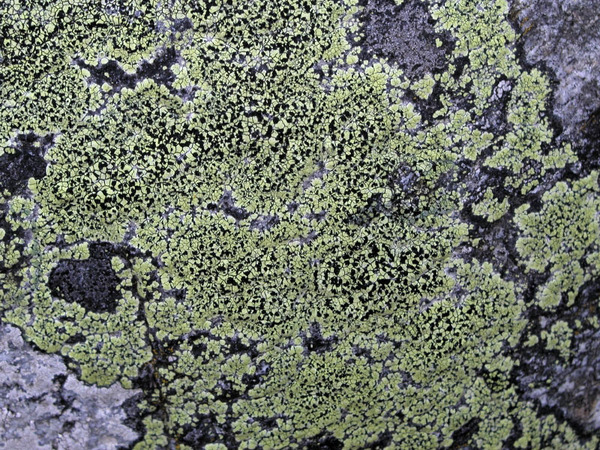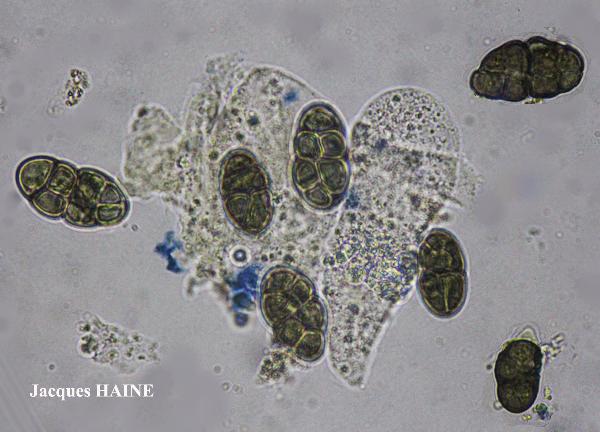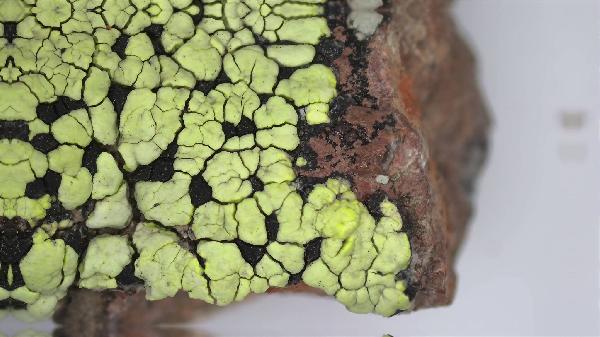Rhizocarpon geographicum (L.) DC. subsp. geographicum
in Lamarck & de Candolle, Fl. Franç., 3 éd., 2: 365, 1805. Basionym: Lichen geographicus L. - Sp. Pl., 2: 1140, 1753.
Synonyms: Lecidea atrovirens (L.) Ach.; Lecidea atrovirens var. geographica (L.) Ach.; Lecidea geographica (L.) Rebent.; Lecidea geographica var. atrovirens (L.) Schaer.; Lichen atrovirens L.; Patellaria geographica (L.) Duby; Rhizocarpon arnoldii Räsänen; Rhizocarpon geographicum (L.) DC. s.lat.; Rhizocarpon geographicum var. atrovirens (L.) Körb.; Rhizocarpon haeyrenii Räsänen; Rhizocarpon semilecanorinum Räsänen; Rhizocarpon tinei sensu Runemark excl. subsp. tinei; Rhizocarpon tinei subsp. vulgare Runemark
Description: Thallus crustose, episubstratic, bright to pale yellow-green, areolate, forming 2-8 cm wide patches delimited by a black prothallus which is often visible also as a hypothallus between the areoles. Areoles angular, 0.4-0.8 mm wide, usually much wider than thick, contiguous, flat to slightly convex, smooth, epruinose, usually matt. Cortex 30-60 µm thick, without a distinct structure; medulla white, I+ blue. Apothecia frequent, lecideine, arising between the areoles, angular, 0.3-0.7 mm across, with a black, flat to weakly convex, epruinose disc and a soon excluded proper margin. Proper exciple pale brown to brownish red; epithecium reddish brown to reddish violet, K+ distinctly purple-red; hymenium colourless to greenish, 110-160 µm high, K/I+blue, K+ greenish; paraphysoids strongly coherent, richly branched and anastomosing, the apical cells clavate; hypothecium dark brown, K-. Asci 8-spored, clavate, fissitunicate, with a well-developed tholus that is K/I- in lower part and K/I+ blue near the apex, lacking an ocular chamber, Rhizocarpon-type. Ascospores muriform, with 6-10 cells visible in optical view, soon becoming dark green to brown, ellipsoid, 20-32(-40) x 10-15(-16) µm, halonate at least when young. Photobiont chlorococcoid. Spot tests: medulla K-, C-, KC-, P+ yellow. Chemistry: cortex with rhizocarpic acid, medulla with psoromic acid and sometimes 2’-O-demethylpsoromic acid; epithecium with low concentrations of gyrophoric acid.
Growth form: Crustose
Substrata: rocks
Photobiont: green algae other than Trentepohlia
Reproductive strategy: mainly sexual
Commonnes-rarity: (info)
Alpine belt: very common
Subalpine belt: extremely common
Montane belt: common
Dry submediterranean belt: very rare
Humid submediterranean belt: very rare
Padanian area: absent
pH of the substrata:
1 2 3 4 5
Solar irradiation:
1 2 3 4 5
Aridity:
1 2 3 4 5
Eutrophication:
1 2 3 4 5
Poleotolerance:
0 1 2 3
Altitudinal distribution:
1 2 3 4 5 6
Rarity
absent
extremely rare
very rare
rare
rather rare
rather common
common
very common
extremely common
Loading data...
Occurrence data
Predictive map
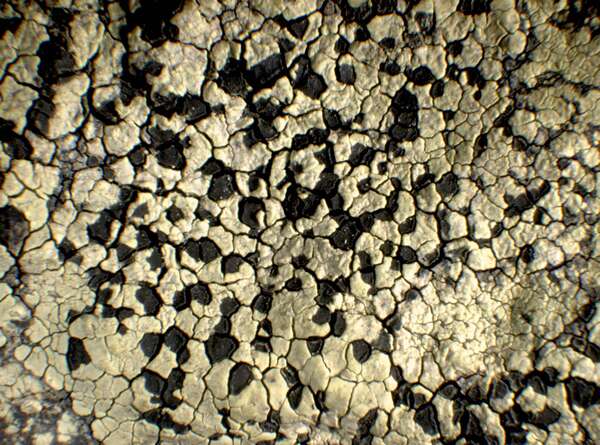
P.L. Nimis; Owner: Department of Life Sciences, University of Trieste
Herbarium: TSB (4015)
2001/12/11
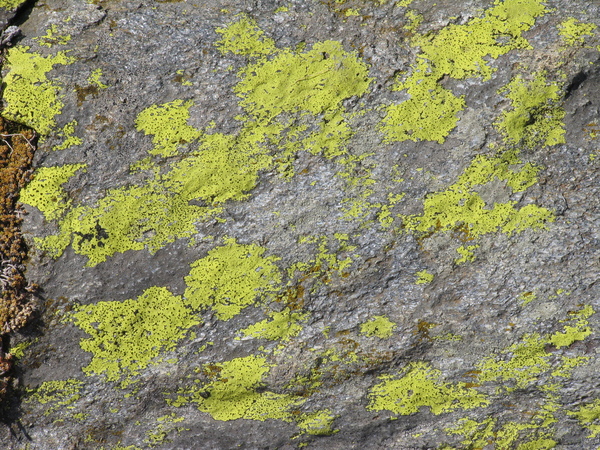
Tomi Trilar; Owner: Slovenian Museum of Natural History
Italy, Piemonte, Ivrea, Ivrea (mountains)
13.09,2007
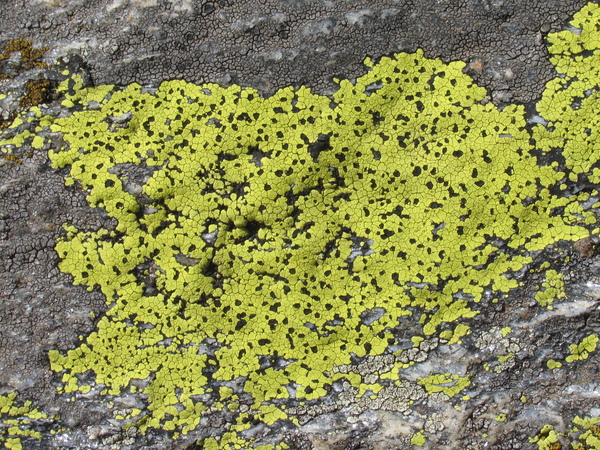
Tomi Trilar; Owner: Slovenian Museum of Natural History
Italy, Piemonte, Ivrea, Ivrea (mountains)
13.09,2007
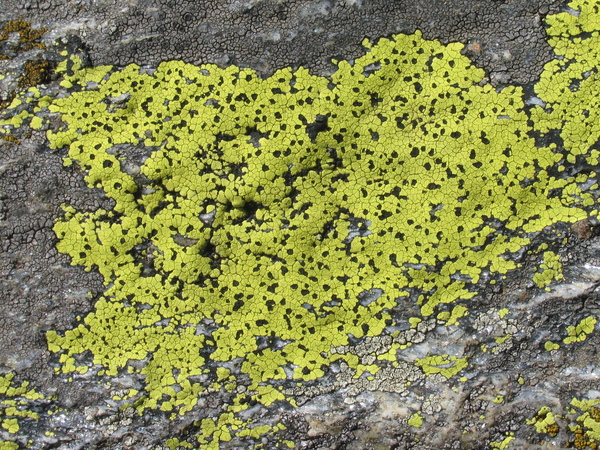
Tomi Trilar; Owner: Slovenian Museum of Natural History
Italy, Piemonte, Ivrea, Ivrea (mountains)
13.09,2007
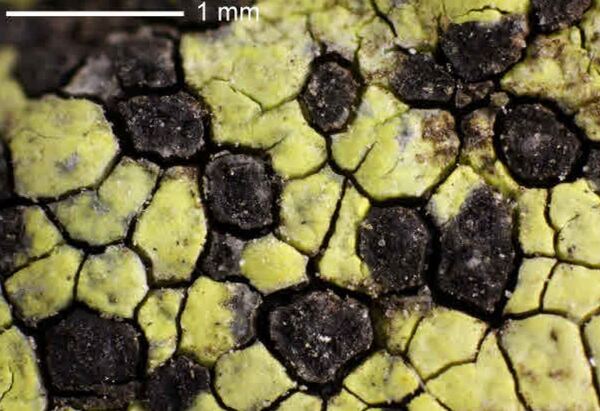
Felix Schumm – CC BY-SA 4.0
[14282]Österreich, Vorarlberg: Verwall-Gruppe, Silbertal ca. 7 km E von Schruns, zwischen dem Teufelsbach Wasserfall und dem Gasthof Fellimännle, 47°05' N, 10°00' E, ca 900-1100 m, GF 8926/1, an Silikatfelsen im koniferenreichen Mischwald in Bachnähe. Leg. Schumm & Schönbrodt 30.08.2008. Det. Schumm (vid Feuerer) 2008
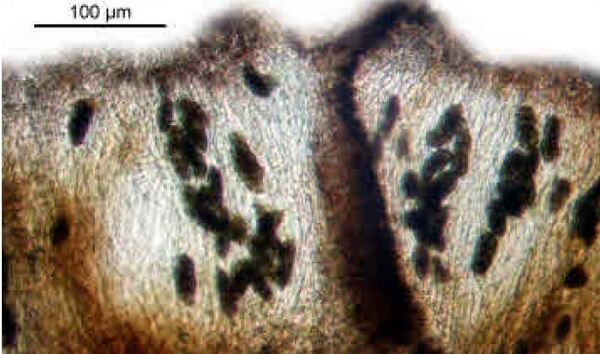
Felix Schumm – CC BY-SA 4.0
[14282]Österreich, Vorarlberg: Verwall-Gruppe, Silbertal ca. 7 km E von Schruns, zwischen dem Teufelsbach Wasserfall und dem Gasthof Fellimännle, 47°05' N, 10°00' E, ca 900-1100 m, GF 8926/1, an Silikatfelsen im koniferenreichen Mischwald in Bachnähe. Leg. Schumm & Schönbrodt 30.08.2008. Det. Schumm (vid Feuerer) 2008
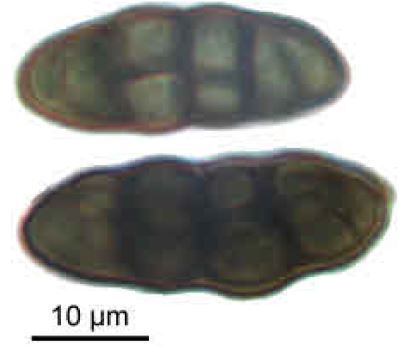
Felix Schumm – CC BY-SA 4.0
[14282]Österreich, Vorarlberg: Verwall-Gruppe, Silbertal ca. 7 km E von Schruns, zwischen dem Teufelsbach Wasserfall und dem Gasthof Fellimännle, 47°05' N, 10°00' E, ca 900-1100 m, GF 8926/1, an Silikatfelsen im koniferenreichen Mischwald in Bachnähe. Leg. Schumm & Schönbrodt 30.08.2008. Det. Schumm (vid Feuerer) 2008
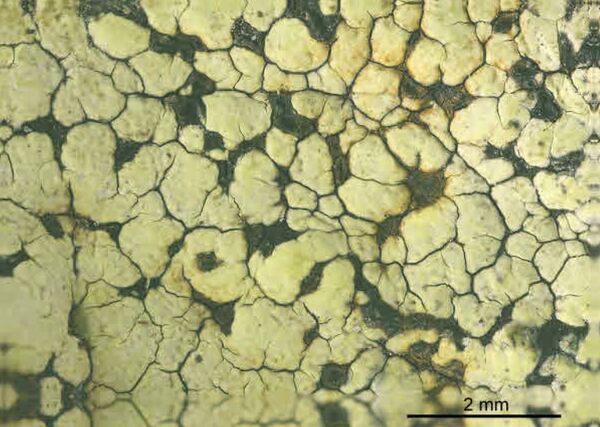
Felix Schumm – CC BY-SA 4.0
[16529], Österreich, nordöstlich von Ischgl beim Silvretta Stausee, ca. 2000 m. Leg. A. Matuschewski 07.2010. Det. Schumm 07.2010
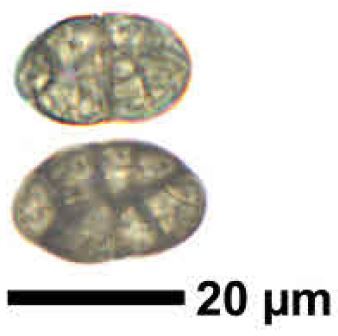
Felix Schumm – CC BY-SA 4.0
[16529], Österreich, nordöstlich von Ischgl beim Silvretta Stausee, ca. 2000 m. Leg. A. Matuschewski 07.2010. Det. Schumm 07.2010
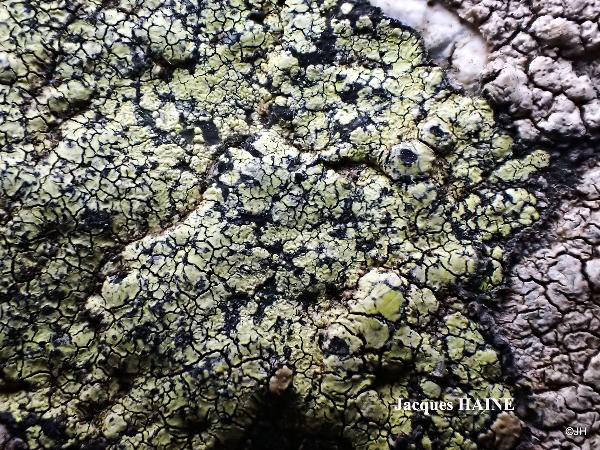
Jacques Haine - Source: http://www.lichensmaritimes.org/index.php?task=fiche&lichen=1417&lang=en
France, Pointe du Van
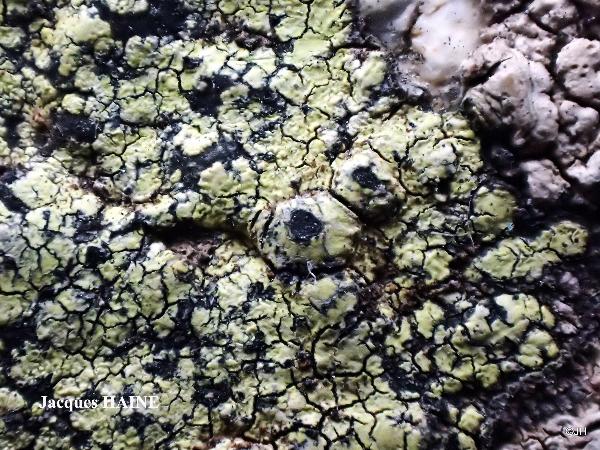
Jacques Haine - Source: http://www.lichensmaritimes.org/index.php?task=fiche&lichen=1417&lang=en
France, Pointe du Van
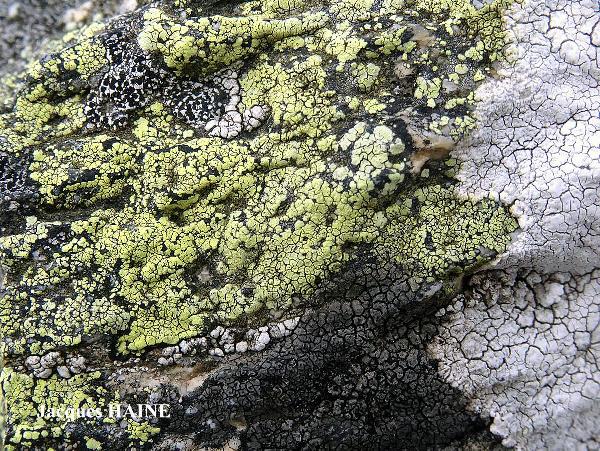
Jacques Haine - Source: http://www.lichensmaritimes.org/index.php?task=fiche&lichen=1417&lang=en
France, Pointe du Van
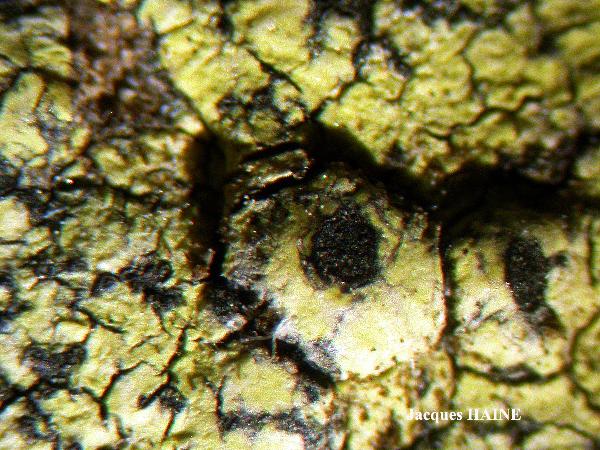
Jacques Haine - Source: http://www.lichensmaritimes.org/index.php?task=fiche&lichen=1417&lang=en
France, Pointe du Van

Jacques Haine - Source: http://www.lichensmaritimes.org/index.php?task=fiche&lichen=1417&lang=en
France, Pointe du Van
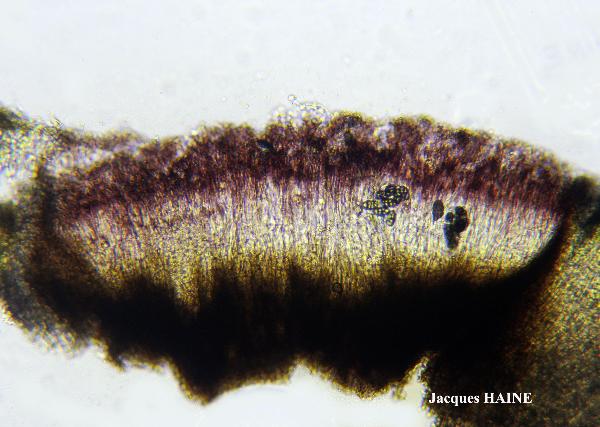
Jacques Haine - Source: http://www.lichensmaritimes.org/index.php?task=fiche&lichen=1417&lang=en
France, Pointe du Van
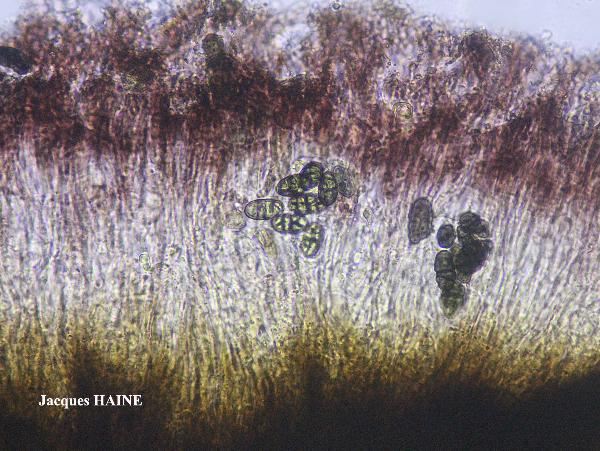
Jacques Haine - Source: http://www.lichensmaritimes.org/index.php?task=fiche&lichen=1417&lang=en
France, Pointe du Van
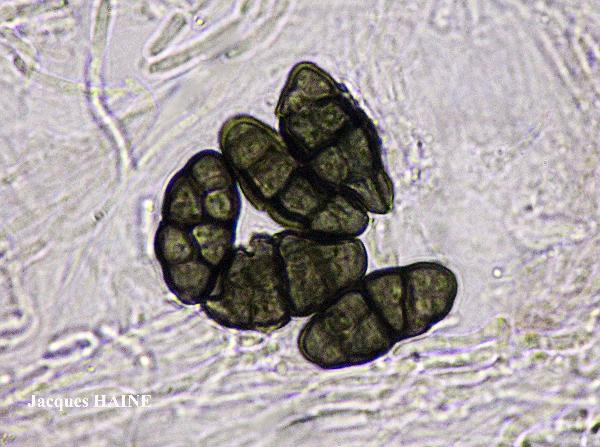
Jacques Haine - Source: http://www.lichensmaritimes.org/index.php?task=fiche&lichen=1417&lang=en
France, Pointe du Van
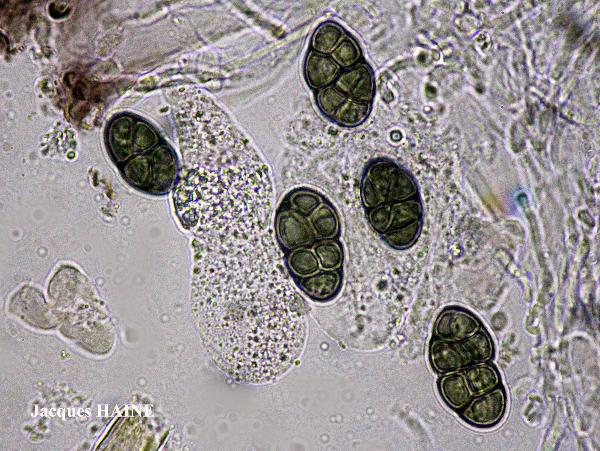
Jacques Haine - Source: http://www.lichensmaritimes.org/index.php?task=fiche&lichen=1417&lang=en
France, Pointe du Van
Growth form: Crustose
Substrata: rocks
Photobiont: green algae other than Trentepohlia
Reproductive strategy: mainly sexual
Commonnes-rarity: (info)
Alpine belt: very common
Subalpine belt: extremely common
Montane belt: common
Dry submediterranean belt: very rare
Humid submediterranean belt: very rare
Padanian area: absent
pH of the substrata:
| 1 | 2 | 3 | 4 | 5 |
Solar irradiation:
| 1 | 2 | 3 | 4 | 5 |
Aridity:
| 1 | 2 | 3 | 4 | 5 |
Eutrophication:
| 1 | 2 | 3 | 4 | 5 |
Poleotolerance:
| 0 | 1 | 2 | 3 |
Altitudinal distribution:
| 1 | 2 | 3 | 4 | 5 | 6 |
Rarity
absent
extremely rare
very rare
rare
rather rare
rather common
common
very common
extremely common
Loading data...
Occurrence data
Predictive map

P.L. Nimis; Owner: Department of Life Sciences, University of Trieste
Herbarium: TSB (4015)
2001/12/11

Tomi Trilar; Owner: Slovenian Museum of Natural History
Italy, Piemonte, Ivrea, Ivrea (mountains)
13.09,2007

Tomi Trilar; Owner: Slovenian Museum of Natural History
Italy, Piemonte, Ivrea, Ivrea (mountains)
13.09,2007

Tomi Trilar; Owner: Slovenian Museum of Natural History
Italy, Piemonte, Ivrea, Ivrea (mountains)
13.09,2007

Felix Schumm – CC BY-SA 4.0
[14282]Österreich, Vorarlberg: Verwall-Gruppe, Silbertal ca. 7 km E von Schruns, zwischen dem Teufelsbach Wasserfall und dem Gasthof Fellimännle, 47°05' N, 10°00' E, ca 900-1100 m, GF 8926/1, an Silikatfelsen im koniferenreichen Mischwald in Bachnähe. Leg. Schumm & Schönbrodt 30.08.2008. Det. Schumm (vid Feuerer) 2008

Felix Schumm – CC BY-SA 4.0
[14282]Österreich, Vorarlberg: Verwall-Gruppe, Silbertal ca. 7 km E von Schruns, zwischen dem Teufelsbach Wasserfall und dem Gasthof Fellimännle, 47°05' N, 10°00' E, ca 900-1100 m, GF 8926/1, an Silikatfelsen im koniferenreichen Mischwald in Bachnähe. Leg. Schumm & Schönbrodt 30.08.2008. Det. Schumm (vid Feuerer) 2008

Felix Schumm – CC BY-SA 4.0
[14282]Österreich, Vorarlberg: Verwall-Gruppe, Silbertal ca. 7 km E von Schruns, zwischen dem Teufelsbach Wasserfall und dem Gasthof Fellimännle, 47°05' N, 10°00' E, ca 900-1100 m, GF 8926/1, an Silikatfelsen im koniferenreichen Mischwald in Bachnähe. Leg. Schumm & Schönbrodt 30.08.2008. Det. Schumm (vid Feuerer) 2008

Felix Schumm – CC BY-SA 4.0
[16529], Österreich, nordöstlich von Ischgl beim Silvretta Stausee, ca. 2000 m. Leg. A. Matuschewski 07.2010. Det. Schumm 07.2010

Felix Schumm – CC BY-SA 4.0
[16529], Österreich, nordöstlich von Ischgl beim Silvretta Stausee, ca. 2000 m. Leg. A. Matuschewski 07.2010. Det. Schumm 07.2010

Jacques Haine - Source: http://www.lichensmaritimes.org/index.php?task=fiche&lichen=1417&lang=en
France, Pointe du Van

Jacques Haine - Source: http://www.lichensmaritimes.org/index.php?task=fiche&lichen=1417&lang=en
France, Pointe du Van

Jacques Haine - Source: http://www.lichensmaritimes.org/index.php?task=fiche&lichen=1417&lang=en
France, Pointe du Van

Jacques Haine - Source: http://www.lichensmaritimes.org/index.php?task=fiche&lichen=1417&lang=en
France, Pointe du Van

Jacques Haine - Source: http://www.lichensmaritimes.org/index.php?task=fiche&lichen=1417&lang=en
France, Pointe du Van

Jacques Haine - Source: http://www.lichensmaritimes.org/index.php?task=fiche&lichen=1417&lang=en
France, Pointe du Van

Jacques Haine - Source: http://www.lichensmaritimes.org/index.php?task=fiche&lichen=1417&lang=en
France, Pointe du Van

Jacques Haine - Source: http://www.lichensmaritimes.org/index.php?task=fiche&lichen=1417&lang=en
France, Pointe du Van



